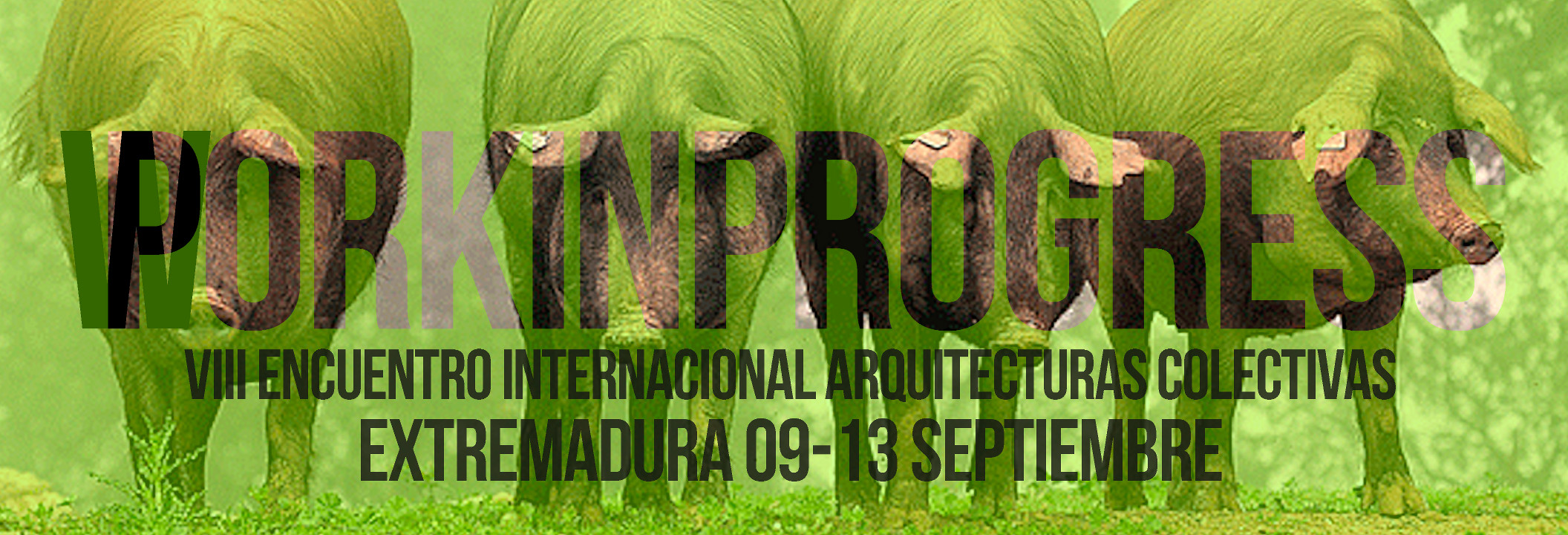Last summer, Erku and David invited me to visit Los Santos de Maimona, a small town in the autonomous community of Extremadura in western Spain, very close to the Portuguese border, for this year’s annual meeting of the Arquitecturas Colectivas (AACC) network.
AACC is a network of people and projects that are actively involved in participatory creation of the urban environment. The aim of the network is to connect different factors that strongly influence urbanisation processes, in order to develop anthropogenic habitats that are characterised by special circumstances, and the communities that live in them. AACC is a complex network that combines practical and construction techniques with more social, cultural and technological aspects of urban contexts.
More specifically, AACC offers an organic framework for cooperation that can be divided into different types of projects and initiatives. It does this principally in three ways:
– Through face-to-face meetings for sharing experiences, workshops, and prototypes,
– Through the Internet and other systems of digital communication,
– Through projects / collaboration processes (analysing and producing works, cooperation and support of participatory processes, resources, pooling of experiences, and mutual support).
The theme of this year’s international meeting, which took place from 9 to 13 September, revolved around the participatory restructuring of urban space. The meeting brought together over 20 collectives and some two hundred people from around Spain, Europe, and Latin America, all involved with diverse practices concerning public matters and the commons.
The slogan of the meeting was “Pork in Progress”, a play on words on many levels inspired, on one hand, by pigs and pig farming, a major industry in the region and one of the most representative symbols of the collective imaginary of Extremadura, and, on the other, the idea of “work in progress” one of the ideas underpinning AACC as a network that is alive, changing, permeable and in constant organic growth.
The meeting took place at LaFábrika detodalavida (LFdTV), a self-managed social laboratory for the management of space, free time, and rural culture that generates cooperative practices based on the philosophies of free culture and the commons. The premises, which are a former cement factory on 40,000 square metres of public land, had been abandoned since 1974 until the LFdTV collective decided to reappropriate it as a self-managed cultural centre.
A pressing task for citizens today is to generate structures that promote cultural management based on an open source philosophy, bypassing entities that do not share those principles and do not have the capacity to adapt to the needs and conditions of the specific space. Self-management as a political act. The AACC meeting was in line with this mission and philosophy, and also aimed to more broadly highlight the needs and priority of citizens, and to promote good practices and strategies that ensure a more participatory society.
Our participation at the AACC meeting was linked to the presentation of the project PublicSpace.Tools (PST), developed by Straddle3 and WWB as a tool for citizen emancipation through critical, creative, and non-conventional applications. During the meeting, the team also worked on expanding and improving the functionality of the AACC website (arquitecturascolectivas.net)
The PST workshop presented guidelines for the activation of public space through the PublicSpace.Tools project that the team has been developing over the past year as an open platform. It is part of a strategy of generating new tools for participatory reconstruction of the urban environment within the AACC community and its philosophy.
I was invited to the meeting to talk about recent developments in Greece in relation to citizen use of public space (as from the start of public works in the lead up to the 2004 Olympic Games in Athens), with a particular focus on parks and green spaces with high levels of vegetation, and about the self-management of these places. At the same time, I had the opportunity to produce a photographic report of the meeting. The debate that followed my presentation showed the shared interest in updating the concept of the Agora – which was the heart of public life in cities in Classical times – for the present.
The AACC meeting was free and open, and its main objective was to share and exchange ideas among participants, with a view to promoting the participatory, collaborative remodelling of the urban environment in all its aspects, through contributions from sociologists, anthropologists, activists, educators, social and cultural managers, landscape designers, environmentalists, urbanists, technology professionals and many others who form part of the community.
Many of the objectives of the organisers were met, including:
– To promote the town of Los Santos de Maimona (including its landscape, peculiarities, culture, and gastronomy) and the region of Extremadura in general, which can be considered peripheral in relation to the administrative centres of Spain.
– To support LaFábrika detodalavida and its structures and processes, as a benchmark project for the recovery of the heritage value of neglected or abandoned public spaces and facilities.
– To explore, reinforce, and publicise some of the collaborative practices that take place in the Extremadura region, so that they can connect to other similar processes/projects at the international level.
This year’s AACC meeting was special in that it strengthened the identity of people and projects in rural areas through collective, creative actions. In short, it showed how people can directly generate self-management processes that contribute to the governance of towns and cities: projects and actions in which people collaborate through collective activities that shape their environment, improve their lives, and, as a result expand and enhance social and economic relations.
At the final assembly, it was collectively decided that the 2016 AACC meeting will take place in the periphery of Madrid, a city very dear to me.




